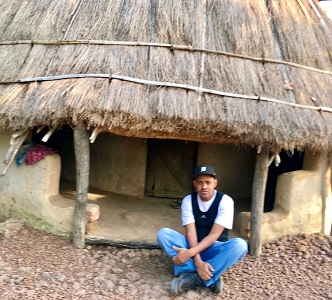Essay
By: Cherno Baba Jallow
December, 2016.
I am in my maternal grandmother’s village of Djoungol, Dalein, north-central Guinea. I have been here for the past four days now. On my first day of this visit, I thought I could not live here; I was somewhat anxious, I must confess. Djoungol is deep in the wilds. On my first night, I went to bed with a secret dread that there might be wild animals roaming around here. But now, on my fourth day, I am afraid no more.
I feel I’ve built enough familiarity with this place that I can now run errands between these villages on the opposite ends of the valley. I can now, unaccompanied, take a walk down this narrow bush road to Hamdalaye, my maternal grandfather’s village. I can even go on a solo wander down to Kolla, the ancestral home of Elhadj Cellou Dalein Diallo, Guinea’s main opposition leader. I need no help with directional precision. And my hosts need not worry about me as I walk to the sunset or disappear in this canopy of trees or beyond these tall shrubs. I’ve convinced myself that I’ve now attained an abundance of geographical understanding of this place. I am a stranger no more.
But what does it take for a traveler, like me, to build such immediate rapport with a new environment and bask in such meteoric adaptability in it? First, there is no gainsaying it: you must like the place. And second, you must be curious about it. Visiting a place is one thing. And immersing yourself in its experience is another. For me, though, and there is nothing allegorical about it, my adjustment in Djoungol has been swift and largely hassle-free. But something deeper explains it all. This visit is no mundane visit. It isn’t just a quest for the frills of adventure. This visit is a homecoming. Well, kind of. I wasn’t born and raised here. I was born and raised in Basse, eastern Gambia. My parents, too.
This is my first trip to Guinea, and I am the first in my Gambian family to set foot here. I am conscious of the extraordinariness of this visit and what it means to me in the context of kinship and ancestry. These are my people, and I am meeting most of them for the first time. And these are my ancestral lands; I am on a mission to mine a rich vein of my family history, to unearth the maternal side and pay homage to it at the same time.
My late grandmother Adama Oury Diallo was born here in the early 1900s. She had three siblings. In the 1920s, she joined grandad in Basse, where they had three children, including my late mother Mariama Jallow. Granny often visited Djoungol, staying in her old mud and thatch-roofed house. Out of respect for her, and in order to preserve its quaintness and give it a sense of historical continuity, the house’s original design has been left intact and the house itself has been shielded from the embellishments of modernity.
Every morning, I start my day with a visit to the house. When I go inside, my thoughts go walk-about. I am smelling history, swept up in a whirlwind of imaginings about this place’s past, about how granny and others before her, lived here in this one-family village.
It used to be about 15 houses here; now only four remain. My uncle Boubacarr Issa Diallo lives with his mother, two wives and kids in the larger share of the family home. In another part, live my cousin Omar Telly Diallo, his dad, wife and kids. And located a few meters away, near the hill, is the cemetery, housing the remains of several members of the family, going back several generations, in over 200 years.
Djoungol is a picturesque setting with no immediate neighbors. It is closed in on all sides by thick forests and hills. Perhaps, it is the smallest in central Dalein. Perhaps, it is comparable only to the village of Tongo in Dalein Hinde, further west. Hamdalaye, my maternal grandfather’s village, lies further southwest. M’bohel is on the west. Keriwoye is in the east. And beyond the hilltops, on the far north, is B’houndou Mawn’dou. Perhaps, Djoungol’s isolation is a consequence of geographical providence. Or perhaps, this is simply the result of the natural hollowing-out of communities and the migratory patterns of people.
But this microcosm of a village, steeped in the wilderness, brings a certain anthropological allure to it. And I, this stranger from distant shores, has been thinking much of it. I really like it here. It is ruminatively quiet. The only sound in this village is the one around it; it’s the distant hooting of diurnal birds, the hoo-hoo-hooing of, perhaps, the African eagle-owl. The sound is daily, and it comes from the hill near the family cemetery. I am unbothered. I know I am soaking up history and natural beauty, rejoicing in peace and tranquility, far removed from the clangor of city life – the life of Labe or Conakry, or New York City, my permanent home.
**** **** ****
Folks, mainly women, pass by here every morning. They notice me, and they wonder, I am sure, who I am and where I come from. Some, unable to keep their curiosities in check, openly ask about me. They walk up to me as I read a book or warm my hands over the log fire in the family courtyard. They say hello and thank me for coming. They share pleasantries and stories with me and my people. But generally, they – these everyday women – just want to go about their daily errands. So, soon they head out towards the hills or into the thick bushes on the way to the other villages or to the stream down the trail.
Life carries on.




